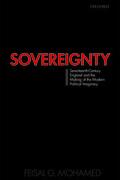
Sovereignty is the first-order question of a politics attaching itself to the state, and seventeenth-century England provides an important case study in the roots of its modern iterations. With these central claims in view, this book explores the thought of Thomas Hobbes, John Milton, and Andrew Marvell, as well as lesser-known figures, such as William Fiennes, Lord Saye and Sele, and John Barclay. In addition to political philosophy and literary studies, it also takes account of the period’s legal history, such as the exercise of the crown’s feudal rights through the Court of Wards and Liveries, the status of corporations and contracts, debates over habeas rights, and the contested jurisdiction of prerogative courts. Theorizing sovereignty in a way that points forward to later modernity, the book critiques key concepts in the thought of Carl Schmitt: the mechanization of the state; land appropriation and legal order; the concept of the “people”; the pluralist state; and the protection–obedience axiom.